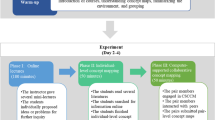Abstract
People learn whenever and wherever possible, and whatever they like or encounter – Mathematics, Drama, Art, Languages, Physics, Philosophy, and so on. With the bursting of knowledge, evaluation of one’s understanding of conceptual knowledge becomes increasingly difficult. There are a lot of demands for evaluating one’s understanding of a piece of knowledge, e.g., facilitating personalized recommendations; discovering one’s expertises and deficiencies in a field; recommending a learning material to practice meaningful learning etc. Assessment of understanding of knowledge is conventionally practiced through tests or interviews, but they have some limitations such as low-efficiency and in-comprehensive. We propose a new method to estimate one’s understanding of conceptual knowledge, by keeping track of his/her learning activities. It overcomes some limitations of traditional methods, hence complements traditional methods.
Access this chapter
Tax calculation will be finalised at checkout
Purchases are for personal use only
Similar content being viewed by others
Notes
- 1.
It can be found at http://psychclassics.yorku.ca/Ebbinghaus/memory7.htm.
References
Ackerman, M.S., Dachtera, J., Pipek, V., Wulf, V.: Sharing knowledge and expertise: the CSCW view of knowledge management. Comput. Support. Coop. Work (CSCW) 22(4–6), 531–573 (2013)
Averell, L., Heathcote, A.: The form of the forgetting curve and the fate of memories. J. Math. Psychol. 55(1), 25–35 (2011)
Blei, D.M., Ng, A.Y., Jordan, M.I.: Latent Dirichlet allocation. J. Mach. Learn. Res. 3, 993–1022 (2003)
Bush, V.: As we may think. ACM SIGPC Notes 1(4), 36–44 (1979)
Cliath, B.Á., Rialtais, O.D.F., Alliance, T.S., Laighean, S.T., Rialtais, F., Post-tráchta, A.R.: Learning for life. In: White paper on adult education (2000)
Cordeiro, F., et al.: Barriers and negative nudges: exploring challenges in food journaling. In: Proceedings of the 33rd Annual ACM Conference on Human Factors in Computing Systems, pp. 1159–1162. ACM (2015)
Ebbinghaus, H.: Memory: A Contribution to Experimental Psychology, no. 3. University Microfilms (1913)
Fritz, T., Huang, E.M., Murphy, G.C., Zimmermann, T.: Persuasive technology in the real world: a study of long-term use of activity sensing devices for fitness. In: Proceedings of the SIGCHI Conference on Human Factors in Computing Systems, pp. 487–496. ACM (2014)
Gemmell, J., Bell, G., Lueder, R., Drucker, S., Wong, C.: Mylifebits: fulfilling the memex vision. In: Proceedings of the tenth ACM International Conference on Multimedia, pp. 235–238. ACM (2002)
Hiebert, J.: Conceptual and Procedural Knowledge: The Case of Mathematics. Routledge, Abingdon (2013)
Hofmann, T.: Probabilistic latent semantic indexing. In: Proceedings of the 22nd Annual International ACM SIGIR Conference on Research and Development in Information Retrieval, pp. 50–57. ACM (1999)
Hunt, D.P.: The concept of knowledge and how to measure it. J. Intellect. Cap. 4(1), 100–113 (2003)
Kay, M., Morris, D., Kientz, J.A., et al.: There’s no such thing as gaining a pound: reconsidering the bathroom scale user interface. In: Proceedings of the 2013 ACM International Joint Conference on Pervasive and Ubiquitous Computing, pp. 401–410. ACM (2013)
Kaye, J.J., McCuistion, M., Gulotta, R., Shamma, D.A.: Money talks: tracking personal finances. In: Proceedings of the SIGCHI Conference on Human Factors in Computing Systems, pp. 521–530. ACM (2014)
Li, I., Dey, A., Forlizzi, J.: A stage-based model of personal informatics systems. In: Proceedings of the SIGCHI Conference on Human Factors in Computing Systems, pp. 557–566. ACM (2010)
Lindqvist, J., Cranshaw, J., Wiese, J., Hong, J., Zimmerman, J.: I’m the mayor of my house: examining why people use foursquare-a social-driven location sharing application. In: Proceedings of the SIGCHI Conference on Human Factors in Computing Systems, pp. 2409–2418. ACM (2011)
Liu, G.: Topic model supervised by understanding map. arXiv preprint arXiv:2110.06043 (2021)
Liu, G., Jiang, B., Feng, L.: A PDF document re-finding system with a Q &A wizard interface. Knowl.-Based Syst. 131, 1–9 (2017)
Murre, J.M., Dros, J.: Replication and analysis of Ebbinghaus’ forgetting curve. PLoS ONE 10(7), e0120644 (2015)
Paradise, R., Rogoff, B.: Side by side: learning by observing and pitching in. Ethos 37(1), 102–138 (2009)
O. PISA. Measuring student knowledge and skills. The PISA Assessment of Reading. Mathematical and Scientific Literacy (2000)
Rubin, D.C., Wenzel, A.E.: One hundred years of forgetting: a quantitative description of retention. Psychol. Rev. 103(4), 734 (1996)
Schacter, D.L.: Psychology, 2nd edn. Worth Publishers, New York (2011)
Sung, J., Ponce, C., Selman, B., Saxena, A.: Unstructured human activity detection from RGBD images. In: 2012 IEEE International Conference on Robotics and Automation (ICRA), pp. 842–849. IEEE (2012)
Tough, A.: The adult’s learning projects. A fresh approach to theory and practice in adult learning (1979)
Vivacqua, A.S.: Agents for expertise location. : Proceedings of 1999 AAAI Spring Symposium Workshop on Intelligent Agents in Cyberspace, pp. 9–13 (1999)
Author information
Authors and Affiliations
Corresponding author
Editor information
Editors and Affiliations
Rights and permissions
Copyright information
© 2022 The Author(s), under exclusive license to Springer Nature Switzerland AG
About this paper
Cite this paper
Liu, G. (2022). ICKEM: A Tool for Estimating One’s Understanding of Conceptual Knowledge. In: Memmi, G., Yang, B., Kong, L., Zhang, T., Qiu, M. (eds) Knowledge Science, Engineering and Management. KSEM 2022. Lecture Notes in Computer Science(), vol 13368. Springer, Cham. https://doi.org/10.1007/978-3-031-10983-6_4
Download citation
DOI: https://doi.org/10.1007/978-3-031-10983-6_4
Published:
Publisher Name: Springer, Cham
Print ISBN: 978-3-031-10982-9
Online ISBN: 978-3-031-10983-6
eBook Packages: Computer ScienceComputer Science (R0)




